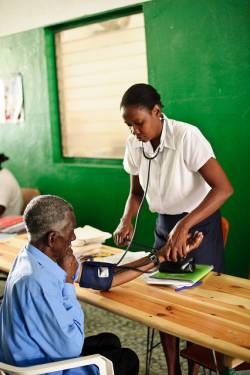 Placing equality at the heart of the post-2015 development agenda is in focus this week as experts, civil society organisations, UN leaders, and Member States meet for the consultation on addressing inequalities in Copenhagen on 18-19 February.
Placing equality at the heart of the post-2015 development agenda is in focus this week as experts, civil society organisations, UN leaders, and Member States meet for the consultation on addressing inequalities in Copenhagen on 18-19 February.
Discussions will focus on the synthesis report of the results of the global public consultation held between September 2012 and January 2013. It’s an important one, as the recommendations from this meeting will feed into the formulation of the future development goals.
It is encouraging that alongside the submissions on a wide range of issues – for example, on economic growth, gender, or young people – the synthesis report includes issues relating to older people – informed by two submissions that HelpAge had contributed to.
This is especially significant to bring attention to the large and growing numbers of older people globally who are highly vulnerable to discrimination, neglect, and isolation.
Discrimination on the basis of age
Older people experience inequality in economic, political, environmental, or social domains. As noted in the synthesis report, these inequalities are reinforced by the discrimination older people face based on their age.
The report draws attention to some main issues, including that older people are perceived to be independent and no longer capable. As a result, they are denied equal access to health services, property rights, decent work, and livelihood opportunities. Similarly, older people living with disabilities experience “double discrimination relating to their age and disability status”. And, as gender-based discrimination is intensified in older age, older women become more vulnerable to abuse and violation of human rights.
A goal to eliminate discrimination
A clear message emerging from the synthesis report is that key to tackling inequalities is addressing its structural causes – such as discrimination.
Therefore, the report rightly recommends that an inequalities goal “should aim to eliminate all forms of discrimination and achieve gender equality”. This goal includes, among others, a target for state accountability to ensure access to basic services for excluded groups, including older people.
There is more work to be done, however, on ensuring that other recommendations – for example, on growth and unemployment, governance, and environmental sustainability – include all disadvantaged people.
HelpAge has also recommended that particularly important is a goal on disaggregation of data by age and sex, as well as disability; and a goal on delivering the universal adoption of social protection floors to guarantee income security across the life course.
Regardless, the synthesis report reflects clearly that “the rights and needs of highly disadvantaged and excluded individuals, families, and groups” – including older people – should be prioritised in actions towards a new development agenda.
Read the full synthesis report.
More on HelpAge’s recommendations:
- Building a future for all ages. Creating an age-inclusive post-2015 development agenda
- Ageing and disability briefing for round table meeting in Monrovia
Submissions to the thematic consultation on inequalities:
- Inequalities relating to health and the life course: Disability, mental illness and older age
- Voices of the marginalized persons with disabilities, older people, people with mental health issues
Find out more on how HelpAge is engaged in the post-2015 process.
